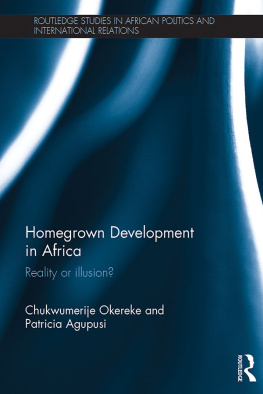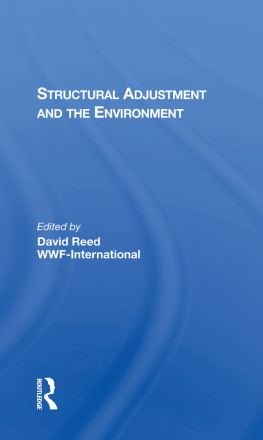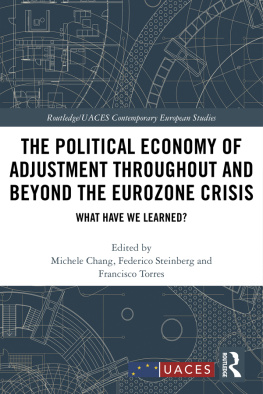
THE POLITICAL ECONOMY OF POST-ADJUSTMENT
The Making of Modern Africa
Series Editors: Abebe Zegeye and John Higginson
Ecology, Civil Society and the Informal Economy in North West Tanzania
Charles David Smith
Ghana in Search of Development The challenge of governance, economic management and institution building
Dan-Bright S. Dzorgbo
From Dictatorship to Democracy Economic Policy in Malawi 1964-2000
Jane Harrigan
Manoeuvring in an Environment of Uncertainty Structural change and social action in sub-Saharan Africa
Edited by Boel Berner and Per Trulsson
Gender, Family and Work in Tanzania
Edited by Colin Creighton and C.K. Omari
Contesting Forestry in West Africa
Edited by Reginald Cline-Cole and Clare Madge
Electoral Territoriality in Southern Africa
Stephen Rule
Community Health Needs in South Africa
Ntombenhle Protasia Khoti Torkington
Consolidation of Democracy in Africa A view from the South
Edited by Hussein Solomon and Ian Liebenberg
Regional and Local Economic Development in South Africa The experience of the Eastern Cape
Etienne Louis Nel
The Political Economy of Post-Adjustment
Towards New Theories and Strategies of Development
HAKIM BEN HAMMOUDA
First published 2003 by Ashgate Publishing
Reissued 2018 by Routledge
2 Park Square, Milton Park, Abingdon, Oxon OX14 4RN
711 Third Avenue, New York, NY 10017, USA
Routledge is an imprint of the Taylor & Francis Group, an informa business
Copyright Hakim Ben Hammouda 2003
The author has asserted his moral right under the Copyright, Designs and Patents Act, 1988, to be identified as the author of this work.
All rights reserved. No part of this book may be reprinted or reproduced or utilised in any form or by any electronic, mechanical, or other means, now known or hereafter invented, including photocopying and recording, or in any information storage or retrieval system, without permission in writing from the publishers.
Notice:
Product or corporate names may be trademarks or registered trademarks, and are used only for identification and explanation without intent to infringe.
Publishers Note
The publisher has gone to great lengths to ensure the quality of this reprint but points out that some imperfections in the original copies may be apparent.
Disclaimer
The publisher has made every effort to trace copyright holders and welcomes correspondence from those they have been unable to contact.
A Library of Congress record exists under LC control number: 2002190887
ISBN 13: 978-1-138-71399-4 (hbk)
ISBN 13: 978-1-315-19797-5 (ebk)
Contents
From the mid-1980s, the South started to experience profound changes and transformations. In fact, the Southeast Asian economies pursued sustained growth dynamics and improved their integration into the international economy. On the other hand, the Latin-American economies were experiencing a deep depression in their economic activity and runaway inflation. And yet, even though the inflation had been controlled by stabilisation policies, these economies were not able to initiate new growth dynamics and reconstruct their competitiveness in order to regain an active integration into the international economy. At the same time, the African and Arab economies underwent deep economic and social crises and were marginalised in the international economy.
These changes were confirmed and exacerbated during the 1990s when, more than ever, the break-up of the unity of the Third World was a noticeable reality at the end of the twentieth century. In fact, even though the Southeast Asian economies pursued their strong growth, the other Third World economies, particularly Africa and the Arab world did not succeed in either resuming growth or ending the marginalisation, despite the implementation of Structural Adjustment Programmes (SAPs), recommended by the World Bank and the International Monetary Fund.
The SAPs sought to establish a stabilisation component in order to reduce the deficits and promote a series of structural reforms, to ensure a greater private regulation of the economy, and to increase the integration of national economies into a globalisation that is considered as essential and irreversible. These two aspects of adjustment policies are crystallised in the strong state disengagement trend. First, the state relinquishes its prerogatives to regulate a coherent functioning of the economy. Thus, planning activities are abandoned and the transfer of high profit activities towards low profit activities are called to question in the name of efficiency. The state then disengages itself from its social functions by reducing its expenditure on health, education and social transfers.
And yet, if it is true that the SAPs enabled some economies to improve and restore their macroeconomic equilibria, they failed to initiate new dynamics of sustained growth in these economies following the loss of impetus in the import-substitution strategy of the 1960s and 1970s.
But we have already started measuring the social impact of adjustment policies in the South. Indeed, the hindrance of dynamics has led to a decrease in job creation. This economic slowdown, associated with a relatively strong demographic growth, gave rise to a rapid increase in unemployment. However, more than this general increase, it is youth unemployment in particular, especially in the urban areas, which developed more rapidly. At the same time as the rapid increase in unemployment, reforms related to adjustment policies led to a decline in real salaries. In addition, the expansion of poverty and exclusion was the immediate effect of the increasing casualisation of the social situation.
Thus, the SAPs did not promote the construction of new economic and social norms to replace the norms in crisis. On the contrary, they accelerated the decomposition of those in crisis and thus exacerbated economic and social regression. At the economic level, the deflationary trends have become stronger. At the social level, more than a deterioration in living conditions of communities, we are faced with two ambivalent societies: on the one hand, a modern society, that is shrinking every day and one that is integrated into the modes of production and consumption that are increasingly globalised; and on the other hand, a field of ruins spreading from the Cairo suburbs to those of Algiers, from rural Burundi and Rwanda to Chiapas and Colombia, where the world of marginality and exclusion unfolds and where violence, disease and drugs are the order of the day.
This economic and social crisis has had important political consequences in the form of protests against the legitimacy of the state. In the Third World, the overtaking of traditional forms of political organisation and the construction of the modern nation-state in the post-colonial period took place on the basis of the commitment of the nationalist elite to ensuring the construction of a consistent economy likely to meet the social needs of the population. Thus, economic development and social promotion form the basis of social compromise in all the countries and constitute the bases for legitimising the nation-state.






